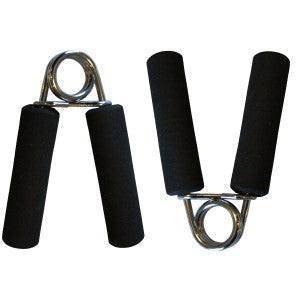Hey, Camp Packers!
As May brings the full swing of spring, it also elevates our anticipation for the fast-approaching summer camp season! Last Monday began our four-part series to share packing techniques for a successful summer camp experience! Get words of the wise, borrowed from ‘The Summer Camp Handbook,’ the comprehensive guidebook written by camp experts, Dr. Chris Thurber and Dr. Jon Malinowski.
Last week, I went over trunks and trunk alternatives such as suitcases, duffels, and backpacks. Now that you have an idea of what type of container your camper will be bringing to camp, it’s time to go over selecting the right gear for your summer camp stay. Thurber and Malinowski break camping gear down into major, manageable groups. Let’s take a look:
Clot hing
hing
I’m sure I don’t have to tell you to pack clothes (it’d be kind of weird if I did), so I’ll skip over all the shirts, the shorts, the pants, cozy hoodies, a s well as extra socks and underwear that we have available on our site. As for our less obvious articles, you’ll certainly want a quality, 100% waterproof raincoat or a hooded poncho when things get wet at camp. If you’re spending time
s well as extra socks and underwear that we have available on our site. As for our less obvious articles, you’ll certainly want a quality, 100% waterproof raincoat or a hooded poncho when things get wet at camp. If you’re spending time in the water, be sure to get quick-drying swim suits or trunks. And lastly, bathrobes, while opti
in the water, be sure to get quick-drying swim suits or trunks. And lastly, bathrobes, while opti onal, may provide more comfort than a wrapped towel after a shower.
onal, may provide more comfort than a wrapped towel after a shower.
Footwear
Footwear is extremely important at camp. You’ll need boots for hikes, boots for horseback riding, and boots for rainy days when the campgrounds are rendered messy and muddy. The same as boots, make sure you have the right kind of sneakers for the activities that you plan to do at camp. It’s typically a good idea to bring two pairs—a newer pair for sports (specific to tennis or basketball requirements) and an older pair for everyday wear.
make sure you have the right kind of sneakers for the activities that you plan to do at camp. It’s typically a good idea to bring two pairs—a newer pair for sports (specific to tennis or basketball requirements) and an older pair for everyday wear.
As for sandals, they’re both useful and popular, though some camps required that all  footwear have closed toes, to prevent injuries. Remember, sandals are not meant for hiking or sports, despite the advertisements. Besides shoes, remember to pack a lot of socks and make sure that they are appropriate for the shoes you’ll be wearing. Pack thick wool socks for your hiking boots and crew-length, cotton-blend socks for sports.
footwear have closed toes, to prevent injuries. Remember, sandals are not meant for hiking or sports, despite the advertisements. Besides shoes, remember to pack a lot of socks and make sure that they are appropriate for the shoes you’ll be wearing. Pack thick wool socks for your hiking boots and crew-length, cotton-blend socks for sports.
Bedding
As it is for  everything, a sound night of sleep is very important at camp. Your camp’s information packet should give you a good idea of what kind of bedding you need to bring whether it’s nothing at all (if the camp is supplying all t
everything, a sound night of sleep is very important at camp. Your camp’s information packet should give you a good idea of what kind of bedding you need to bring whether it’s nothing at all (if the camp is supplying all t he sheets, blankets, and pillows) or everything (if the camp supplies only a cot, bed, platform, or bare earth). We have a great selection of sheets, blankets, mattress pads, mattress covers, as well as pillows and pillowcases from which to choose. We also
he sheets, blankets, and pillows) or everything (if the camp supplies only a cot, bed, platform, or bare earth). We have a great selection of sheets, blankets, mattress pads, mattress covers, as well as pillows and pillowcases from which to choose. We also  have a slew of sleeping bags for all different outdoor conditions. Check them out right here!
have a slew of sleeping bags for all different outdoor conditions. Check them out right here!
Toiletries
As for toiletries, you can check out our towels for washing and drying off after showering, or laying down in the sand! You can find great items like sunblock, insect repellent, lip balm, hairbrushes, and toothbrushes with travel holders all right here! And you can keep all these smaller items in the same spot with one of our many toiletry bags!
Headgear
Of course, headwear is great for a number of reasons. Bandanas and headbands are  helpful to keep hair and sweat out of your face. The summer sun is
helpful to keep hair and sweat out of your face. The summer sun is  blindingly beautiful—make sure to shield your eyes appropriately with hats or even better, sunglasses! Unlike sunglasses, however, hats offer the advantage of keeping ticks off your head. You’ll want to grab swim goggles too if you’re planning on spending time in the water!
blindingly beautiful—make sure to shield your eyes appropriately with hats or even better, sunglasses! Unlike sunglasses, however, hats offer the advantage of keeping ticks off your head. You’ll want to grab swim goggles too if you’re planning on spending time in the water!  Other Gear
Other Gear
There’s a bunch of miscellaneous gear that’s mandatory at any camp: a laundry bag,  flashlight, and water bottle. But we have a lot of other fun items that you might consider taking along as well—depending on your interests. We have books
flashlight, and water bottle. But we have a lot of other fun items that you might consider taking along as well—depending on your interests. We have books  for quiet time, cameras (which may or may not be allowed at your camp), classic Jacks, playing cards, and so much more is here for your entertainment. Lastly, if you’re hoping to get letters back from your camper, it’s only smart to send them with stationery including pre-addressed and pre-stamped envelopes.
for quiet time, cameras (which may or may not be allowed at your camp), classic Jacks, playing cards, and so much more is here for your entertainment. Lastly, if you’re hoping to get letters back from your camper, it’s only smart to send them with stationery including pre-addressed and pre-stamped envelopes.
It’s a lot, but it helps to see all this gear broken up to provide organization and clarity. For a look that goes further in-depth of this phase and all other phases of packing and sending your kid to camp entirely, order ‘The Summer Camp Handbook’ for yourself. And be sure to come back next Monday for our tips and advice on labeling your gear and camp clothing! As always, thanks for reading.
- John




 Today is the last Monday in April. I’ve held off posting about dry land exercises for swimmers until now because swimming is the most popular camp activity and I wanted to grab as much attention as I could!
Today is the last Monday in April. I’ve held off posting about dry land exercises for swimmers until now because swimming is the most popular camp activity and I wanted to grab as much attention as I could! —exactly the muscles used in that kicking motion to propel yourself forward under water. Squats are easy; just stand with your feet at shoulder-width apart and, with your back straight and head up, bend at the knees until your thighs are nearly parallel to the ground. Then push yourself back up.
—exactly the muscles used in that kicking motion to propel yourself forward under water. Squats are easy; just stand with your feet at shoulder-width apart and, with your back straight and head up, bend at the knees until your thighs are nearly parallel to the ground. Then push yourself back up. pper body strength with Shoulder Touches. Get into the position for push-ups, but instead of lowering and raising your body, shift your weight so you can hold yourself up with one arm and touch the shoulder of the supporting arm with your other hand. Ten of these should have you feeling pretty wiped.
pper body strength with Shoulder Touches. Get into the position for push-ups, but instead of lowering and raising your body, shift your weight so you can hold yourself up with one arm and touch the shoulder of the supporting arm with your other hand. Ten of these should have you feeling pretty wiped. Plank. The Plank position is the same as the position to do a push-up only you support yourself with your elbows and forearms instead of your hands. It may not sound like much, but simply holding this position is exercise enough!
Plank. The Plank position is the same as the position to do a push-up only you support yourself with your elbows and forearms instead of your hands. It may not sound like much, but simply holding this position is exercise enough! Leg Raises
Leg Raises
 To help give you a clearer idea of what these exercises look like,
To help give you a clearer idea of what these exercises look like, 
 eights) are great ways to build strength in your arms and shoulders. Even more intricate of an exercise are Hand Grips. These will help develop the muscles in your fingers for difficult-to-hold-onto-rocks.
eights) are great ways to build strength in your arms and shoulders. Even more intricate of an exercise are Hand Grips. These will help develop the muscles in your fingers for difficult-to-hold-onto-rocks. es when climbing, you’ll need your legs to make impossible strides upward and to push the rest of your body to the next point of pausing. Jogging is always a great way to build up those leg muscles. You’ll also want to incorporate some of the exercises we recommended for horse riding like
es when climbing, you’ll need your legs to make impossible strides upward and to push the rest of your body to the next point of pausing. Jogging is always a great way to build up those leg muscles. You’ll also want to incorporate some of the exercises we recommended for horse riding like make far reaches and gliding steps. Sitting with your legs outstretched and touching your toes is one great way to extend the span of your stretching. For those with a chin-up bar available, you can practice what is called a ‘Deadhang’ in which you hold yourself up by your fingers. If you have a Finger-Board, that would be most convenient.
make far reaches and gliding steps. Sitting with your legs outstretched and touching your toes is one great way to extend the span of your stretching. For those with a chin-up bar available, you can practice what is called a ‘Deadhang’ in which you hold yourself up by your fingers. If you have a Finger-Board, that would be most convenient.

 lie on your back and bend your knees with or without a ball between your thighs—then lift your buttocks off the floor and squeeze the ball. You should hold this position for 8 to 15 seconds.
lie on your back and bend your knees with or without a ball between your thighs—then lift your buttocks off the floor and squeeze the ball. You should hold this position for 8 to 15 seconds.



